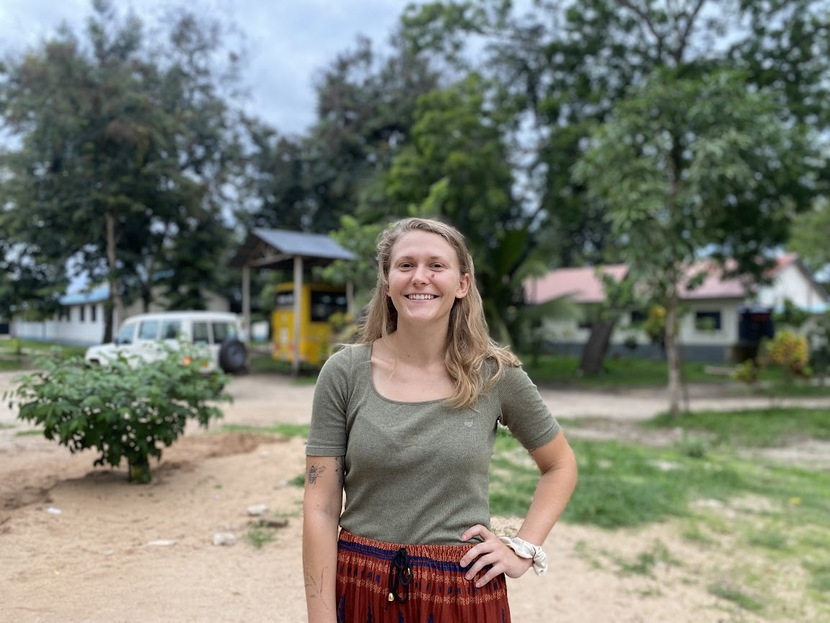
Interview with Mary Mael, Project Manager, BOHEMIA
As a child, what did you want to be when you grew up? Were you already attracted to the field of health?
As a child I wanted to work in every possible profession you could imagine, one day it was a vet and the next day it was a lawyer. As I got older, my interests did start to narrow towards the direction of health. I stumbled into public health completely by accident. I was in my second semester of university, still completely lost on what to choose as my major, when I heard someone talking about their major in Public Health. I thought, “that sounds kind of cool” so I went home and looked it up and a week later I ended up choosing it. The initial plan was to get a Master of Dietetics and work in a hospital because I was interested in nutrition, but my love for travel drew me to global health.
What are your earliest memories of malaria? When did you first learn about this disease?
My earliest memory of malaria is when I studied it very briefly during my undergraduate degree, I am fortunate to have not known about malaria earlier. I grew up in a country where malaria isn’t an issue so it is not something that is ever really talked about, outside of the global health circles. It wasn’t until the BOHEMIA project that I started to really learn about malaria and its devastating consequences.
When you heard of the BOHEMIA project, what did you first think about using ivermectin for malaria control?
It took me some time to fully understand how unique this project is. Unlike most clinical trials, we are approaching our trial participants to take a drug that will not immediately protect them from malaria, but would instead help break the transmission cycle, reducing malaria in the future.
Unlike most clinical trials, we are approaching our trial participants to take a drug that will not immediately protect them from malaria, but would instead help break the transmission cycle, reducing malaria in the future.
During my first few weeks, the Chief Scientific Officer, Carlos Chaccour had me read some published literature on the topic, and the more I read the more I started to grasp the idea. The ivermectin for malaria strategy is an innovative, new, and bold way of approaching vector control.
What is your role in the BOHEMIA trial and what do your day-to-day tasks look like? How did your role in BOHEMIA evolve since the first time you joined the project?
I am the Sponsor Project Manager so my role in the simplest sense is making sure the grant’s overall deliverables and milestones that were set with the funder ‘Unitaid’ prior to being awarded the grant are being met. This involves making sure the trial sites are operating smoothly, but there are other non-trial-related deliverables, like scalability and engagement with drug manufacturers, that need to be tracked as well.
My days vary greatly depending on the project’s needs at that time. Some days my work is more focused on big-picture project tracking, like submitting reports to Unitaid and tracking the progress of the trials. On other days my work is much more hands-on. Since we are a small team and there is a lot of work to do, I often work directly with the site team, planning operations and logistics. Either way, my job requires attending a lot of meetings and tracking what each team member is doing to make sure the project progresses within the timeframe we have set.
My role has evolved greatly since starting the project. I started as a project assistant. I didn’t have much experience in global health and had just moved to Barcelona looking for my first job outside of the USA. I was in this role for two and a half years. But when the project manager left, I was offered their role. This came as a shock initially and I was slightly intimidated, but I was excited about the opportunity to grow professionally and was up for the new challenge.
What are some of the challenges while managing a project like BOHEMIA? How do you overcome them?
Managing a large mass drug administration trial like BOHEMIA is no joke. Be it logistical challenges such as the supply and delivery of trial materials, the procurement of certain items in a country, or operational issues like staffing, delay in timelines, protocol approvals delays, or language barriers, I have dealt with almost everything.
But at the end of the day, every challenge has a solution. It just requires perseverance and multiple creative minds sitting together bouncing ideas off of each other until one of them is crazy enough to work.
What do you think is needed to advance the fight against malaria in Kenya, and how does BOHEMIA fit in?
Money and innovation. Mosquitos are smart. Until we find that magical silver bullet to end malaria, we need to continue adding new and innovative tools and strategies to the malaria toolbox. This requires sustained funding, creativity, and passionate people who envision a world where no child dies of malaria.
Until we find that magical silver bullet to end malaria, we need to continue adding new and innovative tools and strategies to the malaria toolbox.
What are some takeaways from your time in Mozambique and Kenya. What are the similarities and differences between the two sites?
Apart from being two east African countries, Mozambique and Kenya could not be any more different. Both countries have distinct cultures, languages, and climates. Even the issues we encounter at the trial sites are vastly different. After having spent significant time working in both countries and coordinating teams from the two sites, my biggest takeaway is – Always remember that those based on the site know best. Just because it isn’t working how you expected, doesn’t mean it isn’t working. As the project manager, I have had to set aside my workflow applications and adapt to new methods to get things done. In short, remember to be humble and respect the culture.






